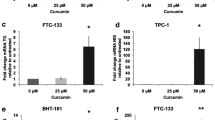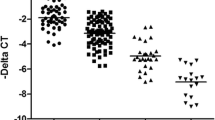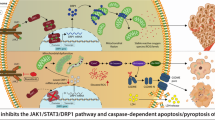Abstract
Proteasome inhibitors are promising antitumor drugs with preferable cytotoxicity in malignant cells and have exhibited clinical efficiency in several hematologic malignancies. P53-dependent apoptosis has been reported to be a major mechanism underlying. However, apoptosis can also be found in cancer cells with mutant-type p53, suggesting the involvement of p53-independent mechanism. Tumor suppressor forkhead Box O3 is another substrate of proteasomal degradation, which also functions partially through inducing apoptosis. The aim of this study was to explore the effect of proteasome inhibition on the expression and activity of forkhead Box O3 in thyroid cancer cells. Using flow cytometry, western blot, immunofluorescence staining and quantitative RT-PCR assays, we assessed proteasome inhibitor MG132-induced apoptosis in thyroid cancer cells and its effect on the expression and activity of forkhead Box O3. The resulted showed that MG132 induced significant apoptosis, and caused the accumulation of p53 protein in both p53 wild-type and mutant-type thyroid cancer cell lines, whereas the proapoptotic targets of p53 were transcriptionally upregulated only in the p53 wild-type cells. Strikingly, upon MG132 administration, the accumulation and nuclear translocation of transcription factor forkhead Box O3 as well as transcriptional upregulation of its proapoptotic target genes were found in thyroid cancer cells regardless of p53 status. Cell apoptosis was enhanced by ectopic overexpression while attenuated by silencing of forkhead Box O3. Altogether, we demonstrated that proteasome inhibitor MG132 induces thyroid cancer cell apoptosis at least partially through modulating forkhead Box O3 activity.






Similar content being viewed by others
Abbreviations
- ATC:
-
Anaplastic thyroid cancer
- DMSO:
-
Dimethylsulfoxide
- FOXO3a:
-
Forkhead Box O3
- GADD45a:
-
Growth Arrest And DNA-Damage-Inducible 45 Alpha
- MAPK:
-
RAS/RAF/MEK/ERK
- MDM2:
-
Mouse Double Minute 2
- PBS:
-
Phosphate-buffered saline
- PDTC:
-
Poorly-differentiated thyroid cancer
- PI3K/Akt:
-
phosphatidylinositol-3-kinase/Akt
- qRT-PCR:
-
Quantitative RT-PCR
- WDTC:
-
Well-differentiated thyroid cancer
References
A. Jemal, F. Bray, M.M. Center et al., Global cancer statistics. CA Cancer J. Clin. 61, 69–90 (2011)
M. Xing, Molecular pathogenesis and mechanisms of thyroid cancer. Nat. Rev. Cancer 13, 184–199 (2013)
W.R. Burns, M.A. Zeiger, Differentiated thyroid cancer. Semin. Oncol. 37, 557–566 (2010)
W.R. Cornett, A.K. Sharma, T.A. Day et al., Anaplastic thyroid carcinoma: an overview. Curr. Oncol. Rep. 9, 152–158 (2007)
R.Z. Orlowski, D.J. Kuhn, Proteasome inhibitors in cancer therapy: lessons from the first decade. Clin. Cancer. Res. 14, 1649–1657 (2008)
L.J. Crawford, B. Walker, A.E. Irvine, Proteasome inhibitors in cancer therapy. J. Cell Commun. Signal. 5, 101–110 (2011)
D. Buac, M. Shen, S. Schmitt et al., From Bortezomib to other inhibitors of the proteasome and beyond. Curr. Pharm. Des. 19, 4025–4038 (2013)
J. Adams, V.J. Palombella, E.A. Sausville et al., Proteasome inhibitors: a novel class of potent and effective antitumor agents. Cancer Res. 59, 2615–2622 (1999)
S.J. Stoll, S.C. Pitt, H. Chen, Follicular thyroid cancer cell growth inhibition by proteosome inhibitor MG132. J. Surg. Res. 156, 39–44 (2009)
C.S. Mitsiades, D. McMillin, V. Kotoula et al., Antitumor effects of the proteasome inhibitor bortezomib in medullary and anaplastic thyroid carcinoma cells in vitro. J. Clin. Endocrinol. Metab. 91, 4013–4021 (2006)
D. Chen, M. Frezza, S. Schmitt et al., Bortezomib as the first proteasome inhibitor anticancer drug: current status and future perspectives. Curr. Cancer Drug Targets. 11, 239–253 (2011)
B. Vogelstein, D. Lane, A.J. Levine, Surfing the p53 network. Nature 408, 307–310 (2000)
A.J. Levine, M. Oren, The first 30 years of p53: growing ever more complex. Nat. Rev. Cancer 9, 749–758 (2009)
K.H. Vousden, C. Prives, Blinded by the light: the growing complexity of p53. Cell. 137, 413–431 (2009)
J.P. Kruse, W. Gu, Modes of p53 regulation. Cell 137, 609–622 (2009)
T. Iwakuma, G. Lozano, MDM2, an introduction. Mol. Cancer Res. 1, 993–1000 (2003)
U.G. Lopes, P. Erhardt, R. Yao, p53-dependent induction of apoptosis by proteasome inhibitors. J. Biol. Chem. 272, 12893–12896 (1997)
C.G. Concannon, B.F. Koehler, C. Reimertz et al., Apoptosis induced by proteasome inhibition in cancer cells: predominant role of the p53/PUMA pathway. Oncogene 26, 1681–1692 (2007)
W.X. Ding, H.M. Ni, X. Chen et al., A coordinated action of Bax, PUMA, and p53 promotes MG132-induced mitochondria activation and apoptosis in colon cancer cells. Mol. Cancer Ther. 6, 1062–1069 (2007)
S.A. Vaziri, D.R. Grabowski, J. Hill et al., Inhibition of proteasome activity by bortezomib in renal cancer cells is p53 dependent and VHL independent. Anticancer Res. 29, 2961–2969 (2009)
X. Zhang, N. Tang, T.J. Hadden et al., Akt, FoxO and regulation of apoptosis. Biochim. Biophys. Acta 1813, 1978–1986 (2011)
H. Huang, D.J. Tindall, Regulation of FOXO protein stability via ubiquitination and proteasome degradation. Biochim. Biophys. Acta 1813, 1961–1964 (2011)
M.S. Sheikh, M.C. Hollander, A.J. Fornance Jr., Role of Gadd45 in apoptosis. Biochem. Pharmacol. 59, 43–45 (2000)
S.A. Rosemary, D.R. Richardson, Growth arrest and DNA damage-45 alpha (GADD45alpha). Int. J. Biochem. Cell Biol. 41, 986–989 (2009)
H. Tran, A. Brunet, J.M. Grenier et al., DNA repair pathway stimulated by the forkhead transcription factor FOXO3a through the Gadd45 protein. Science 296, 530–534 (2002)
C. Weidinger, K. Krause, A. Klagge et al., Forkhead box-O transcription factor: critical conductors of cancer’s fate. Endocr. Relat. Cancer 15, 917–929 (2008)
K. Maiese, Z.Z. Chong, Y.C. Shang, OutFOXOing disease and disability: the therapeutic potential of targeting FoxO proteins. Trends Mol. Med. 14, 219–227 (2008)
D.R. Plas, C.B. Thompson, Akt activation promotes degradation of tuberin and FOXO3a via the proteasome. J. Biol. Chem. 278, 12361–12366 (2003)
S. Karger, C. Weidinger, K. Krause et al., FOXO3a: a novel player in thyroid carcinogenesis?. Endocr. Relat. Cancer 16, 189–199 (2009)
L.P. Van Der Heide, M.F. Hoekman, M.P. Smidt, The ins and outs of FoxO shuttling: mechanisms of FoxO translocation and transcriptional regulation. Biochem. J. 380, 297–309 (2004)
W.S. Dalton, The proteasome. Semin. Oncol. 31, 3–9 (2004)
A. Hershko, Roles of ubiquitin-mediated proteolysis in cell cycle control. Curr. Opin. Cell Biol. 9, 788–799 (1997)
A.M. Ruschak, M. Slassi, L.E. Kay et al., Novel proteasome inhibitors to overcome bortezomib resistance. J. Natl. Cancer Inst. 103, 1007–1017 (2011)
M. Cavo, Current status of bortezomib in the treatment of multiple myeloma. Curr. Hematol. Malig. Rep. 2, 128–137 (2007)
P. Moreau, P.G. Richardson, M. Cavo et al., Proteasome inhibitors in multiple myeloma: 10 years later. Blood 120, 947–959 (2012)
J.Z. Qin, J. Ziffra, L. Stennett et al., Proteasome inhibitors trigger NOXA-mediated apoptosis in melanoma and myeloma cells. Cancer Res. 65, 6282–6293 (2005)
T. Devine, M.S. Dai, Targeting the ubiquitin-mediated proteasome degradation of p53 for cancer therapy. Curr. Pharm. Des. 19, 3248–3262 (2013)
M. Hollstein, D. Sidransky, B. Vogelstein et al., p53 mutations in human cancers. Science 253, 49–53 (1991)
Y. Dobashi, H. Sugimura, A. Sakamoto et al., Stepwise participation of p53 gene mutation during dedifferentiation of human thyroid carcinomas. Diagn. Mol. Pathol. 3, 9–14 (1994)
T. Hideshima, P. Richardson, D. Chauhan et al., The proteasome inhibitor PS-341 inhibits growth, induces apoptosis, and overcomes drug resistance in human multiple myeloma cells. Cancer Res. 61, 3071–3076 (2001)
D. Yin, H. Zhou, T. Kumagai et al., Proteasome inhibitor PS-341 causes cell growth arrest and apoptosis in human glioblastoma multiforme (GBM). Oncogene 24, 344–354 (2005)
S.J. Strauss, K. Higginbottom, S. Jüliger et al., The proteasome inhibitor bortezomib acts independently of p53 and induces cell death via apoptosis and mitotic catastrophe in B-cell lymphoma cell lines. Cancer Res. 67, 2783–2790 (2007)
Y. Ogawara, S. Kishishita, T. Obata et al., Akt enhances Mdm2-mediated ubiquitination and degradation of p53. J. Biol. Chem. 277, 21843–1850 (2002)
J.Y. Yang, M.C. Hung, Deciphering the role of forkhead transcription factors in cancer therapy. Curr. Drug Targets 12, 1284–1290 (2011)
Z. Jagani, K. Song, J.L. Kutok et al., Proteasome inhibition causes regression of leukemia and abrogates BCR-ABL-induced evasion of apoptosis in part through regulation of forkhead tumor suppressors. Cancer Res. 69, 6546–6555 (2009)
S.K. Roy, Q. Chen, J. Fu et al., Resveratrol inhibits growth of orthotopic pancreatic tumors through activation of FOXO transcription factors. PLoS One 6, e25166 (2011)
A. Wilk, K. Urbanska, M. Grabacka et al., Fenofibrate-induced nuclear translocation of FoxO3A triggers Bim-mediated apoptosis in glioblastoma cells in vitro. Cell Cycle 11, 2660–2671 (2012)
S. Fernández de Mattos, P. Villalonga, J. Clardy, FOXO3a mediates the cytotoxic effects of cisplatin in colon cancer cells. Mol. Cancer Ther. 7, 3237–3246 (2008)
A. Sunters, P.A. Madureira, K.M. Pomeranz et al., Paclitaxel-induced nuclear translocation of FOXO3a in breast cancer cells is mediated by c-Jun NH2-terminal kinase and Akt. Cancer Res. 66, 212–220 (2006)
A. Singh, M. Ye, O. Bucur et al., Protein phosphatase 2A reactivates FOXO3a through a dynamic interplay with 14-3-3 and AKT. Mol. Biol. Cell 21, 1140–1152 (2010)
Acknowledgements
This work was supported by the National Natural Science Foundation of China (No. 81372217 and 81572627), Science and Technology Project of Shaanxi Province (No. 2014K11-01-01-09), the Fundamental Research Funds for the Central Universities (No. xjj2015022) and Fund of First Affiliated Hospital of Xi’an Jiaotong University (No. 2014YK2).
Author information
Authors and Affiliations
Corresponding author
Ethics declarations
Conflict of interest
The authors declare that they have no competing interests.
Electronic supplementary material
Rights and permissions
About this article
Cite this article
Qiang, W., Sui, F., Ma, J. et al. Proteasome inhibitor MG132 induces thyroid cancer cell apoptosis by modulating the activity of transcription factor FOXO3a. Endocrine 56, 98–108 (2017). https://doi.org/10.1007/s12020-017-1256-y
Received:
Accepted:
Published:
Issue Date:
DOI: https://doi.org/10.1007/s12020-017-1256-y




